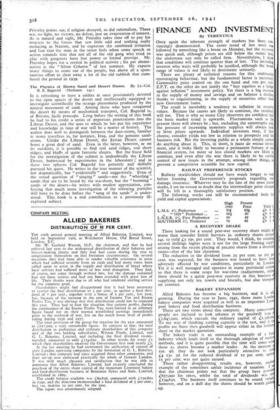FINANCE AND INVESTMENT
By TERENTIUS
ONCE again the inherent strength of Markets has been con. vincingly demonstrated. The easier trend of last week was followed by something like a break on Monday, but the recovery was quick and, although prices are still below the recent be the undertone can only be called firm. Nevertheless, I think that conditions will continue quieter than of late. The intending investor who waits will probably be justified, although the broad range of values is not likely to deteriorate seriously. There are plenty of technical reasons for this stubbornly encouraging behaviour, but the fundamental factor is monetary, Commodity price control on the one hand and too per cent. E.P.T. on the other do not justify the " buy equities as a hedge against inflation " investment policy. Yet there is a big increase in the supply of money and savings and on balance a decline, thanks to requisitioning, in the supply of securities other than new Government loans.
The result is inevitably a tendency to inflation in security values. Because the causes are likely to continue, the tendency will too. That is why so many City observers are confident that the basic market trend is upwards. Fluctuations such as the present there will always be ; but, excluding the catastrophe risk, the pressure of increasing monetary supplies will always tend to lever prices upwards. Individual investors may, if they choose, consider yields too low in relation to prospects and the business risk. But the investing public as a whole simply cannot do anything about it. This, in short, is faute de mieux invest- ment, and it looks likely to become a permanent feature of our financial system, fox more or less closed markets are likely to continue, and even after the war there is likely to be careful control of new issues in the attempt, among other things, to prevent a competitive scramble for new capital.
RAILWAY PREFERENCE STOCKS
Railway stockholders should not have much longer to wait before learning the Government's proposals regarding war damage insurance. Whatever may be the fate of the most junior stocks, I see no reason to doubt that the intermediate prior charges will be left in a thoroughly satisfactory positiOn.
The following stocks can still be recommended both for yield and capital appreciation: High Present 1940 Price Yield % L.M.S. 4% Preference ... 701 6311. £6 6 0
"1923" Preference ... 604 50 £8 0 0
L.N.E.R. 4% First Preference ... 60 49 £8 3 I SOUTHERN 5% Preferred ... 79 62 £8 1
A RECOVERY SHARE
Those looking for a sound post-war recovery share might d worse than consider Initial Services 5s. ordinary shares around 14s. to yield £s 19s. per cent. They would, I think, be standing several shillings higher were it not for the large floating suppl arising from the recent placing of 500,00o shares from a dec estate—that of the late chairman.
The reduction in the dividend from 25 per cent. to 16-1 cent. was expected, for the business was bound to have be adversely affected by war conditions, particularly in Londe Yet it is well managed and operates in many provincial cenu• so that there is some scope for war-time readjustment, whil there should be a quick post-war recovery in this business supplying not only tea, towels and biscuits, but also transpo on contract.
BAKERY EXPANSION
Allied Bakeries has become a big business, and it is s growing. During the year to June, 1941, three more Lond bakery companies were acquired as well as an important Liver pool bakery and food distribution business. There are two views about this company. Many conservab people are inclined to look askance at the goodwill item L1,647,000, which exceeds the ordinary capital of £1,398, To my way of thinking earning capacity is the test, and if tb profits are there then goodwill will appear either in the balan sheet or the market quotation. The bakery trade is an outstanding example of a bore. industry which lends itself to the thorough adoption of mods methods, and it is quite possible that the time will come wh these 5s. shares become a market leader. At the moment los. 9d. they do not look particularly attractive to Yie £4 13s. 3d. for the reduced dividend of to per cent. again' 15 per cent. was not quite earned. These rather disappointing results are, however, anoth' example of the sometimes unfair incidence of taxation. I, that the chairman points out that the group have proved k657,00o for taces, whilst the total of dividends was £134,630. The business itself continues to be. sound en' however, and on a dull day the shares should be worth p up.


























 Previous page
Previous page